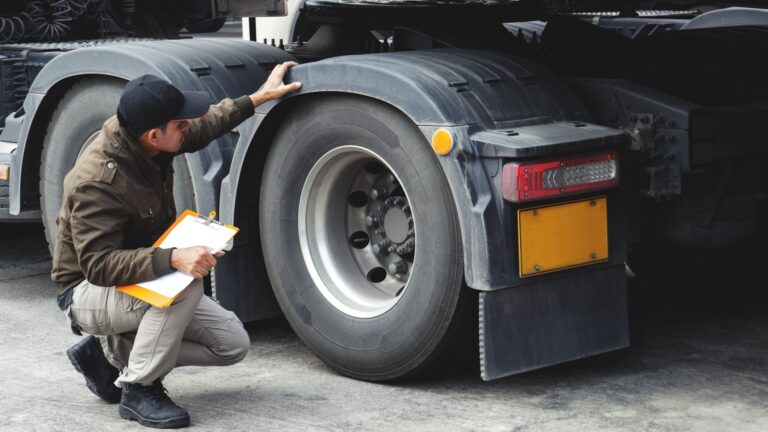
Minor infractions may seem inconsequential and easily sorted but multiple failings can aggregate into an immediate prohibition and subsequent criminal prosecution.
In this issue we hear from Karl Jones of downstream fuel industry insurance specialist OAMPS, who discusses how a through regime of ADR equipment checks can avoid potentially awkward conversations with the regulators.
Complying with the law
The Road Traffic Acts and Construction & Use Regulations make it law that a vehicle must be roadworthy when used on a public road.
How to comply with these laws is explained in various government guidance booklets, including the Guide to Maintaining Roadworthiness from the DVSA.
The requirements around the movement of dangerous goods are understandably more rigorous, with a raft of requirements relating not only to the appropriate paperwork, but also the provision of suitable PPE and other safety equipment such as fire extinguishers.
Historically, there has been sporadic police interventions (often intelligence-led) but there has been neither the resource nor the breadth of knowledge with dangerous goods to allow a more co-ordinated UK-wide enforcement strategy.
However, as a result of a number of factors, including the discovery of 39 migrants in a trailer in Essex in 2019, the 2023 Home Office Strategic Policing Requirements include an enhanced focus on the effective policing of our roads, with specific mention of the movement of dangerous goods and the need for officers to have the required knowledge and training to enable dangerous goods enforcement.
The 43 Police forces in England & Wales now have an ever-growing number of specialist Commercial Vehicle Units which are now focusing more on roadside checks, and with both the number of police officers involved in these initiatives growing and the level of knowledge increasing, including qualified Dangerous Goods Safety Advisers (DGSAs), Transport Managers and ADR drivers, it’s more increasingly likely that your drivers will be encountering these teams on the road.
According to the team involved in a 2023 DVSA inspection day at Sandbach services on the M1, 48% of the random inspections of vehicles carrying dangerous goods were non-compliant, and immediate prohibition notices were issued to 14% of the vehicles checked.
The DVSA Categorisation of Defects lists three types:
I – denotes an immediate prohibition
D – denotes a delayed prohibition
IN – denotes an inspection notice (which is followed up by the HSE)
In addition to the DVSA defects checklist, goods subject to ADR regulations are assessed using a national form, called 10-500. This form asks for additional information on more administrative areas such as consignment details and compliant transport documentation, as well as any observations that the inspecting officer feels appropriate. A copy of this form is also sent to the operator/ Transport Manager, as well as the relevant DGSA being informed so that they can then engage with the company and provide support and ongoing advice in order to bring the operation back to being compliant as quickly and cost effectively as possible.
Minor infractions of ADR regulations on their own may well not constitute an immediate prohibition, but if there are multiple failings, these can aggregate into an immediate prohibition and subsequent criminal prosecution, with a follow up visit to the Traffic Commissioners Office. So, whilst a missing eye wash bottle, or an orange board in the wrong orientation may seem insignificant in isolation, these often lead to a more in depth inspection often revealing missing fire extinguishers, insecure loads, no transport documents, even no driving licence.
Whilst making the ADR equipment check part of the daily walk round checks will mean the checks take a bit longer, doing so can save you some potentially awkward conversations with the regulators.
Consequences
There are a range of issues that could arise from your vehicles and/or drivers failing these checks, including:
• PG9s issued – immediate prohibition of the vehicle and load
• Drivers fined/licence endorsed – fines can be as much as £5,000 or more
• Operator Licence amended or withdrawn
• Tachograph offences – delays or additional costs if substitute driver/vehicles needed
• Time sensitive consignments destroyed or consequential losses for late delivery
• An unlimited fine for breaching the legislation relating to the carriage of dangerous goods
Insurance protection could also be an issue – failure to maintain vehicles is a general condition within most policies, so own damage claims arising from such a failure could be declined. In egregious breaches, the policy could even be cancelled from inception or last renewal if there are non-disclosures of material facts such as operator licence offences.
What can you do?
The first line of defence is adherence to the policies and procedures that are in place to ensure vehicles leaving your premises do so in a roadworthy state; so make sure that daily defect checks are carried out effectively, and that all required documentation relating to dangerous goods is present and correct.
Our advice is to have drivers check their ADR equipment every day if they are going to be undertaking the carriage of Dangerous Goods; this becomes really important if your transport operation involves drivers remaining away from their operating centre during the week doing multiple deliveries and collections, as they are away from the replacement equipment if it is missing or defective.
Daily defect checks should take around 15 minutes to complete, and it’s vital that employees are given enough time to complete these checks.
Whether you decide to set up competition between drivers to reward compliance or penalise non-compliance (or both), drivers should be incentivised to conduct these checks diligently and be encouraged to report any areas of concern.
You should also have a policy in place to respond to any 10-500 forms that are received.
You also need to ensure anyone driving has a valid licence to do so (yes, there are still people out there who think they can get away with not disclosing they’ve lost their licence to their employers) and your driver handbook includes mention of Drug and Alcohol misuse and that you can evidence that they are fit to drive.
Whilst poor driving is a more frequent factor in fatal and serious collisions, it is also important to ensure that your vehicles do not become unsafe and pose a greater risk to public safety.
To find out more about how OAMPS can support and protect your business, please visit www.oamps.co.uk or call 01372 869 700.
The sole purpose of this article is to provide guidance on the issues covered. This article is not intended to give legal advice, and, accordingly, it should not be relied upon. It should not be regarded as a comprehensive statement of the law and/or market practice in this area. We make no claims as to the completeness or accuracy of the information contained herein or in the links which were live at the date of publication. You should not act upon (or should refrain from acting upon) information in this publication without first seeking specific legal and/or specialist advice. Pen Underwriting Limited and OAMPS, part of Pen Underwriting Limited, accepts no liability for any inaccuracy, omission or mistake in this publication, nor will we be responsible for any loss which may be suffered as a result of any person relying on the information contained herein.
OAMPS Hazardous Industries is part of Pen Underwriting Limited which is authorised and regulated by the Financial Conduct Authority (FCA number 314493). Registered Office: The Walbrook Building, 25 Walbrook, London EC4N 8AW. Registered in England and Wales. Company Number: 5172311.
Image Credit: istock images
